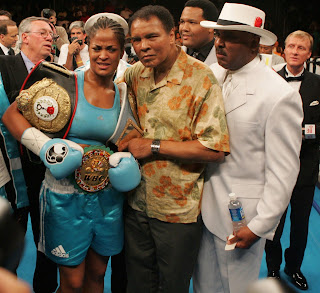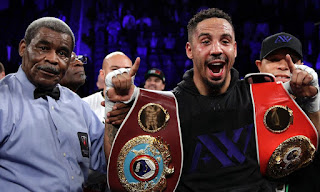 |
| Starling celebrates with trainers Roach and Futch |
By Jeffrey Freeman — It’s hard for the typical fight fan to understand exactly what the
current criteria are for induction into the International Boxing Hall of
Fame. Boxing, unlike baseball or professional football, does not rely
on a cold and calculated interpretation of statistics to determine
eligibility and induction. It’s much more complicated than that. Or far
more simple, depending on how you look at it. In our sport, the observer
has real power. Greatness is in the eye of the individual beholder.
What he or she sees, thinks, and does -- matters.
Don’t believe me? Consider any split or majority decision.
According to their website, the mission of the IBHOF (located in upstate
Canastota, New York since 1989) is, among other things, to
"chronicle
the achievements of those who excelled" in boxing. A closer look at the
site reveals more about their procedures: "Members of the Boxing
Writers Association of America and an international panel of boxing
historians cast votes. Voters from Japan, England, Canada, Mexico, South
Africa, Germany, Puerto Rico and the United States are among those who
participate in the election process."
 |
| Bowe dumped his green belt in the trash can |
I’ve been to the IBHOF many times and the Brophys, Director Ed and
historian nephew Jeff, do a great job along with their loyal President
Don Ackerman.
In recent years, however, the Hall, and some of its young
new voters in particular, have come under fire for their selection of
some
less than unanimous choices such as Arturo "Thunder" Gatti, Ray "Boom Boom"
Mancini, and Riddick "Big Daddy" Bowe. Critics and dissenters point to their losses
and other perceived shortcomings while those who voted for them must
surely have had their focus on the achievements and fame of those they
ultimately helped to enshrine.
Personally, I’d have voted for two of
three but that’s just me.
Enter
Marlon "Magic Man" Starling, the former undisputed welterweight
champion of the world from Hartford, Connecticut. Starling retired from boxing in
1990, a year after the establishment of boxing’s first true hall of
fame. In those twenty five plus years, Starling’s name has yet to appear
on the ballot for IBHOF voters to either vote for or not. Before
discussing Starling’s qualifications, let me make one thing clear about
the balloting process. It’s a closed one. What that means is that a
small group of IBHOF insiders figuratively pick names from a hat and
then put those choices on the official ballot for the public
consideration of their various international voters. Arturo Gatti, for
example, could not have been voted for and voted in had his name not
been selected by this panel in the first place.
The identity and
decision making process of this internal group remains a mystery to most
outsiders.
They hold the 24K gold key to induction.
 |
| Moochie beat Breland for the WBA |
Why then would they want to put Starling’s name on the ballot? Well, for
starters, theirs is a hall of fame, not a hall of feints. Starling was
actually a master of both. When Starling plied his craft in the
competitive cauldron of the 1980s, he frequently appeared on network
television in primetime. It was there that mainstream fight fans got to
know "Moochie" and his "Starling Stomp" signature move. In televised
battles against Donald "Cobra" Curry, Jose "The Threat" Baret,
and Johnny "Bump City" Bumphus among so many others, Starling made an
unforgettable impression on a generation of fans who still remember him
today and must wonder why he’s not in the hall if lesser skilled
pugilists are. The IBHOF’s inclusion of Gatti could be seen just as
controversially as the exclusion of Starling.
Compiling a career record of 45-6-1 (27), Starling made his pro debut in
1989 after an inauspicious amateur career where he lost in Lowell, Mass
to Robbie Sims of all people. As a professional prizefighter inspired
by the late great Muhammad Ali, Starling had a defensive peek-a-boo
style that made him very difficult to hit, let alone beat. Not unlike
Ali, Starling also possessed the gift of gab.
The young welterweight ran his record to 25-0 before his first loss, a
twelve round split decision to Donald Curry in 1982. To this day,
Starling disputes that subjective defeat just as he disputes his lack of
inclusion in the hall of fame where he is regularly a guest of honor
during annual induction weekends.
"The Hall of Fame is special. I think
Marlon Starling does belong in there," says Marlon of Starling.
Even more ironically, "Cobra" Curry is also still waiting for a call
from the hall that might never come. Curry’s qualifications include
having been the single best pound-for-pound boxer on the planet for a
short period of time, but that’s a debate for another day.
From 1983 to 1986, Starling stayed busy in search of a big money
superfight against the likes of
Sugar Ray Leonard or Tommy Hearns.
Neither match-up was meant to be for "Moochie" who had to settle for
televised bouts against contenders Kevin Howard, Floyd Mayweather Sr.,
and Simon Brown, all of whom Starling defeated by decision. "I have the
respect of the Big Four. That’s what matters to me," says Starling of
Leonard, Hearns, Marvelous Marvin Hagler, and Roberto Duran. "Whenever I
see those guys, I get their respect."
A February 1984 rematch against a prime Donald Curry ended in the
disappointment of another decision loss for Starling.
It was in 1987
however that Starling began to make the most of the opportunities coming
his way.
A televised shot at the WBA welterweight championship against
legendary amateur Mark Breland was all that stood between Starling and
the welterweight title. Following a virtuoso performance from
Starling that highlighted the vast difference between a seasoned pro and
a professionally inexperienced amateur, Breland collapsed in the
eleventh round and just like that Starling was champion of the
"whole
wide world" as he proudly told Alex Wallau on ABC after the win.
In actuality, Starling was not yet
the man who beat the man because of
somebody out there named Lloyd Honeyghan.
 |
| Starling came back strong after the Molinares bout |
It was Honeyghan who upset
Donald Curry for the world welterweight championship in 1986 and before
Starling could move to unify or win universal recognition by beating
Honeyghan, he’d have to go through the politics of a rematch
"draw" with
Breland (one judge scored the fight for Starling as did most fans and
media) and a strange (again televised) knockout loss-turned-no contest
(NC) against Tomas Molinares in 1988. Starling was knocked
absolutely
senseless from a punch that clearly landed after the bell to end the
fifth round.
Though it was later ruled a no contest and the result
nullified, Starling lost his WBA championship and his momentum. Worse,
he was made to look like a fool by HBO’s Larry Merchant during the
unforgettably uncomfortable post-fight interview where Starling claimed
that not only wasn’t he knocked out, he was never even knocked down. It looked like the end was near for Marlon Starling.
But like a Phoenix rising from the ashes, Starling’s best days were
still ahead of him. Less than a year after the Molinares debacle,
Starling received a shot at Lloyd Honeyghan. Because Honeyghan had so
thoroughly thrashed Curry to win the WBC welterweight title, few
observers expected “Moochie” to emerge victorious, particularly after
his brutal "knockout" by Molinares. Boxing the fight of his life,
Starling totally dominated and embarrassed Honeyghan, stopping the puffy
"Ragamuffin Man" in nine rounds to lay claim to the undisputed world
welterweight championship. By fighting and defeating the very best in
the world, Starling had achieved his career goal of becoming the best
welterweight in the world, the true welterweight champion of the
"whole
wide world."
 |
| Starling is THE world welterweight champion |
After reaching his professional peak with the thumping of Honeyghan,
Starling defended the championship once before an ill-fated,
economically driven, move to middleweight where he came up short against
defending 160 pound world champion Michael Nunn, losing by majority
decision. One judge scored it a perfectly even draw, 114-114 while two
others had Nunn winning by wide scores.
In his final bout, Starling returned to welterweight where he dropped
the 147 pound world title to Maurice Blocker by a majority decision
before retiring in 1990, never to return,
forever young in the eyes of
those who saw him box under the bright lights of commercial network
exposure. Again, another judge saw it all even in what was a very close
fight in the ring and on the final scorecards.
So, does Marlon Starling belong in the International Boxing Hall of
Fame? I’d say he does. I asked Starling himself and he answered me with a
question.
"How can Riddick Bowe be in the Hall of Fame if Marlon
Starling isn’t” asked Marlon in his uniquely rhetorical third-person
fashion. Still, that’s not the path to Canastota, even if by all
accounts Starling should at least be on the ballot by now.
You see, boxing is, like most everything else where so much money and
power is involved, very political. Being outspoken, like Starling is and
always has been, can hurt you in this game. Rightly or wrongly, it can
prevent you from getting where you want to go. As a fight writer, I have
experienced it personally and I have seen it applied to some brave
souls who make their living in this, the cruelest sport.
 |
| The Magic Man in Canastota where he belongs |
Marlon Starling was a master defensive fighter. He won the legitimate
world championship of the welterweight division, putting himself on a
straight line that can trace its lineage
all the way back to Sugar Ray
Robinson, the best to ever lace up a pair of gloves. Starling was a TV
star during the glory days of Wide World of Sports and Saturday
afternoon boxing for the masses. Starling overcame strange and
controversial defeats to persevere where few expected he could or would.
Starling’s outgoing and accessible personality endeared him to fans and
it’s good to see that nothing has changed.
Starling, who turned 58 on Monday, August
29, is still
sharp as a tack because boxing is about hitting and not
getting hit. Starling still communicates with his many fans and makes
himself available at boxing events for them to meet and greet him. In
the end, Starling made his mark of excellence on the sport he chose to
compete in and he did so in a way that made an indelible impression on
all those who saw him fight. I will see you in Canastota Champ.
Written by Jeffrey Freeman
Originally Published on The Sweet Science










































